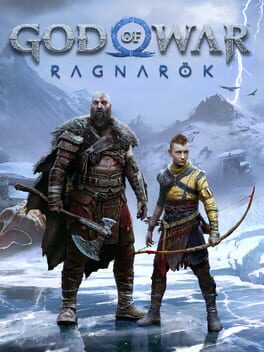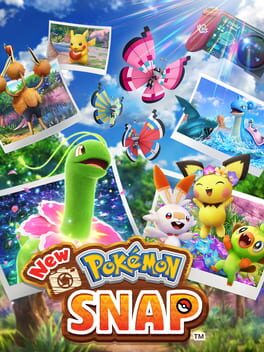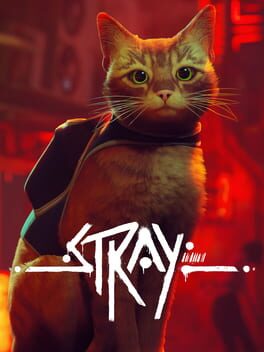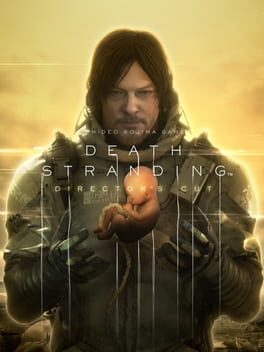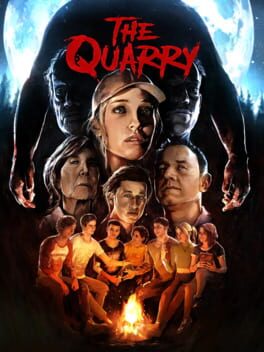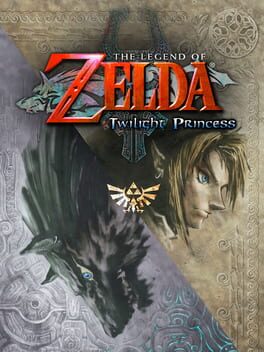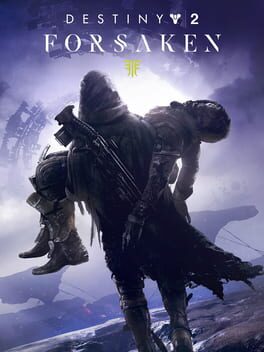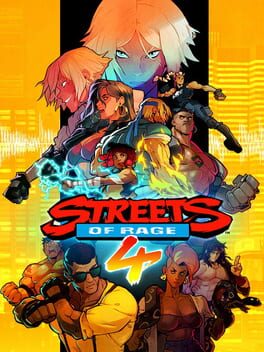Turbo_Sven
BACKER
37 Reviews liked by Turbo_Sven
God of War Ragnarök
2022
This review contains spoilers
I was hoping for a Last of Us 2 sense of dour self seriousness, with the scale of Shadow of the Colossus, a sprinkle of the challenging Baby Souls-like gameplay of Jedi Fallen Order, and the urgency of what a one-shot camera and 'Ragnarok' subtitle imply.
Instead, it's basically just Marvel's Guardians of the Galaxy redo. Same kind of ragtag motley crüe. Similar late 2000s PC wallpaper aesthetic. Similiar kind of after school special writing and tone. Similiar repetitive gameplay. Same meta fakeout credits scene at one point.
My expectations aside, playing this just felt like a chore. The way the gameplay loop is set up. Get some dialogue about how killing is bad. Leap over a rock. Press O to shimmy through a wall. Swing a weapon to nonchalantly dismember some googly monsters while your companions tell you if you're on fire or not. Leave combat arena. Do a light puzzle, get a shiny do-dad. Repeat.
And sure, that's generally how video games go. But because of the slavish devotion to the one shot camera, the game has this very long, drawn out feel. The in-game walk n talks are expository dumps and always feels calculated and robotic, never naturalistic anf in step with the rhythm of the game. The fast travel feels that way too, always timed to end when the convo dies. And the game just feels like it's artificiality padded, all the little elemental puzzles in my way feel there to keep me around another hour. There's no fluidity to the combat.
This would he fine for me if the story was good but it's just as rigid and cliche as the game itself. No surprises. Every line that's walked feels like the perfect script one writes in their head when one imagines themselves after the therapy the plan to take one day. Kratos' authentic edge has been smoothed completely out. He says all the right things and feels all the right things. Atreus misbehaves but all in the good ways one would like their rebellious child to misbehave. Sure, he strays from the path, but he's quick to see the err of his ways and reign himself back in. Freya's rage toned down as well, and what could have been an interesting dramatic web to untangle becomes just another edge sanded away to make room for a simplistic stop the bad man story. The bad man being Odin, another character completely underwritten. There's just no edge to any of this. It feels utterly without consequence.
Instead, it's basically just Marvel's Guardians of the Galaxy redo. Same kind of ragtag motley crüe. Similar late 2000s PC wallpaper aesthetic. Similiar kind of after school special writing and tone. Similiar repetitive gameplay. Same meta fakeout credits scene at one point.
My expectations aside, playing this just felt like a chore. The way the gameplay loop is set up. Get some dialogue about how killing is bad. Leap over a rock. Press O to shimmy through a wall. Swing a weapon to nonchalantly dismember some googly monsters while your companions tell you if you're on fire or not. Leave combat arena. Do a light puzzle, get a shiny do-dad. Repeat.
And sure, that's generally how video games go. But because of the slavish devotion to the one shot camera, the game has this very long, drawn out feel. The in-game walk n talks are expository dumps and always feels calculated and robotic, never naturalistic anf in step with the rhythm of the game. The fast travel feels that way too, always timed to end when the convo dies. And the game just feels like it's artificiality padded, all the little elemental puzzles in my way feel there to keep me around another hour. There's no fluidity to the combat.
This would he fine for me if the story was good but it's just as rigid and cliche as the game itself. No surprises. Every line that's walked feels like the perfect script one writes in their head when one imagines themselves after the therapy the plan to take one day. Kratos' authentic edge has been smoothed completely out. He says all the right things and feels all the right things. Atreus misbehaves but all in the good ways one would like their rebellious child to misbehave. Sure, he strays from the path, but he's quick to see the err of his ways and reign himself back in. Freya's rage toned down as well, and what could have been an interesting dramatic web to untangle becomes just another edge sanded away to make room for a simplistic stop the bad man story. The bad man being Odin, another character completely underwritten. There's just no edge to any of this. It feels utterly without consequence.
God of War Ragnarök
2022
When I saw that Ragnarok was nominated for just about everything at the Game Awards I sorta rolled my eyes and thought "pfsh, of course it is". Now that I've completed it myself... Yeah, of course it is.
This game isn't perfect by any stretch, the combat gets a bit repetitive, there are too many optional bosses/trials/collectible whatnots, and while I've seen a lot of people praise it for being a duology instead of dragging out to a trilogy (which I agree with 100%), it still ironically drags its own runtime out with side content just a bit more than it needs to in my opinion. There's already so much game, I don't need you to ask me to travel all 9 realms looking for flowers/lizards/stags/whatever else at multiple stages throughout the game as an excuse to go back to areas I've spent 5 hours in already. I appreciate that I can access new areas within the realms now and that's great, but there's no need for an entire tab of "1 of 15" and "4 of 10" ...etc when the game is rich with fantastic content and incentive to explore without it.
That aside, the characters and the story are superb, absolutely top marks. People call this a movie game as a negative a lot, which I really don't understand because it's not a movie game in that it's lacking in game and instead just shows you the story.. It's a movie game because it feels like you're playing a movie, the direction, the tension, the whole thing is a journey that you're being taken on, yes, but that you're still in control of just as much as any other game. If the credits role and I feel like I've just finished watching The Lord of the Rings or some shit, how is that a bad thing??? I beat monsters to a pulp for 40 hours and felt fulfilled at the end, like what happened, mattered - damn what a terrible game ( -_・)?
God of War Ragnarok improves upon everything that it's predecessor does, and yeah it shares some of the same flaws but for what it's worth, I think it's blatantly unreasonable to expect them to have made a better sequel than this. Bravo, Santa Monica Studio.
This game isn't perfect by any stretch, the combat gets a bit repetitive, there are too many optional bosses/trials/collectible whatnots, and while I've seen a lot of people praise it for being a duology instead of dragging out to a trilogy (which I agree with 100%), it still ironically drags its own runtime out with side content just a bit more than it needs to in my opinion. There's already so much game, I don't need you to ask me to travel all 9 realms looking for flowers/lizards/stags/whatever else at multiple stages throughout the game as an excuse to go back to areas I've spent 5 hours in already. I appreciate that I can access new areas within the realms now and that's great, but there's no need for an entire tab of "1 of 15" and "4 of 10" ...etc when the game is rich with fantastic content and incentive to explore without it.
That aside, the characters and the story are superb, absolutely top marks. People call this a movie game as a negative a lot, which I really don't understand because it's not a movie game in that it's lacking in game and instead just shows you the story.. It's a movie game because it feels like you're playing a movie, the direction, the tension, the whole thing is a journey that you're being taken on, yes, but that you're still in control of just as much as any other game. If the credits role and I feel like I've just finished watching The Lord of the Rings or some shit, how is that a bad thing??? I beat monsters to a pulp for 40 hours and felt fulfilled at the end, like what happened, mattered - damn what a terrible game ( -_・)?
God of War Ragnarok improves upon everything that it's predecessor does, and yeah it shares some of the same flaws but for what it's worth, I think it's blatantly unreasonable to expect them to have made a better sequel than this. Bravo, Santa Monica Studio.
New Pokémon Snap
2021
I love the original Pokémon Snap, but for whatever reason, this one didn't really click with me. If I had to hazard a guess as to why, and this might sound like a bit of an odd complaint, but I think the game is... too long? Hear me out, the original Pokémon Snap is short and sweet, taking about five hours to beat, maybe even a little less than that. This game's main campaign runs at about twice as long, at around ten hours. In theory, this should be a good thing, it's twice as much Pokémon Snap! The problem is, that's all it is: a longer, prettier Pokémon Snap. Your toolset here is almost identical to that of your toolset in the original, the only difference being that the smoke ball is replaced with Illumina orbs. The game doesn't add any new mechanics to supplement the additional five hours of gameplay, so as a result the main gameplay loop stagnates pretty quickly.
It's still fun in short bursts, and I always get a little burst of excitement seeing a newer Pokémon that I wasn't expecting to be in the game, but the novelty of the Pokémon Snap concept ends up wearing off too quickly to justify the sequel's total length.
It's still fun in short bursts, and I always get a little burst of excitement seeing a newer Pokémon that I wasn't expecting to be in the game, but the novelty of the Pokémon Snap concept ends up wearing off too quickly to justify the sequel's total length.
New Pokémon Snap
2021
Pokemon Snap is far and away my favorite Pokemon game. It was a flawed photography experience in that you were attempting to please an AI that didn't know what photography was but insisted on judging photographs anyway, and the on-rails format wasn't ideal, but the best part of Pokemon to me has always been the charming creature design and friendly vibes. I get some joy out of the standard RPG series, but I was endeared to the world through the original Snap on N64.
I've always wanted a sequel but I envisioned the franchise moving to a downloadable budget format, perhaps every few years, with new locales to explore and Pokemon to see. The biggest compliment I can offer to New Pokemon Snap [great title guys!!] is that this is visually what this concept has always deserved. The scenery is gorgeous, the Pokemon are as cute as ever, and it's nice to see the photo sim expand beyond the original Pokedex. That is an unquestionable improvement over the 1999 original. However I think nearly every other choice they've made--the vast majority of which were made in honor of Value--is detrimental to what this experience is to me.
It's not enough that you aim for a high value photograph of each Pokemon and are rewarded for fun poses--now there are four different "star" categories for each one that are often defined by those poses and actions, each with varying "ratings." It's not enough that you have X number of courses--each course has to have a leveling system where new, incredibly minor scenarios are unlocked at different levels, and also sometimes there is a night version to double the grind. It's not enough to have one "special" course to cap off the game--there are now quite a few of them sprinkled throughout the campaign, and they're about as tedious as the original one which only succeeded through its novelty.
Not much has changed about the core experience of the game though, which is only a blessing insofar as I really wanted another one of these and that was enough to have a decent time. It's such a wasted opportunity though. I wish they spent the last two decades thinking about how to actually evolve this concept, maybe looking at the indie space or games like Afrika. Why is this still on rails? Why did you guys just make this longer? Ugh. Oh well, thanks for including my boy Emolga at least.
I've always wanted a sequel but I envisioned the franchise moving to a downloadable budget format, perhaps every few years, with new locales to explore and Pokemon to see. The biggest compliment I can offer to New Pokemon Snap [great title guys!!] is that this is visually what this concept has always deserved. The scenery is gorgeous, the Pokemon are as cute as ever, and it's nice to see the photo sim expand beyond the original Pokedex. That is an unquestionable improvement over the 1999 original. However I think nearly every other choice they've made--the vast majority of which were made in honor of Value--is detrimental to what this experience is to me.
It's not enough that you aim for a high value photograph of each Pokemon and are rewarded for fun poses--now there are four different "star" categories for each one that are often defined by those poses and actions, each with varying "ratings." It's not enough that you have X number of courses--each course has to have a leveling system where new, incredibly minor scenarios are unlocked at different levels, and also sometimes there is a night version to double the grind. It's not enough to have one "special" course to cap off the game--there are now quite a few of them sprinkled throughout the campaign, and they're about as tedious as the original one which only succeeded through its novelty.
Not much has changed about the core experience of the game though, which is only a blessing insofar as I really wanted another one of these and that was enough to have a decent time. It's such a wasted opportunity though. I wish they spent the last two decades thinking about how to actually evolve this concept, maybe looking at the indie space or games like Afrika. Why is this still on rails? Why did you guys just make this longer? Ugh. Oh well, thanks for including my boy Emolga at least.
Stray
2022
Refreshingly unsentimental where it counts, mostly made up of post-humanist dystopia vibes and not much else. What more do you need in a game than neon lights and a cute kitty though? And this takes full advantage of those on that front. It is confident in its simplicity and knows where to draw the line before becoming needlessly complicated in further building mechanics. The focus remains on the beautifully textured atmosphere and the cat's interactions with the communities and the worlds they inhabit. It's not particularly rich in those explorations and I don't know how this will fare retrospectively but its briskness and accessibility (not to mention gorgeously moody soundtrack) made for a weekend well spent. A rainy day matinee blockbuster wrapped around an indie core. Admirable.
Stray
2022
it's fine. it's cute. it kind of has no idea what kind of game it wants to be. there's one too many AAA elements lumped in almost as if they couldn't say no when someone asked "what about stealth?", "what about combat?", "what about a hub world?", "what about collectibles?", "what about side quests and a inventory?". it could have just been a Limbo or Ico esque minimalist linear journey but I guess you can remove the developers from Ubisoft but the Ubisoft from the developers.
I am also just a little sad that it's a game about robots. why feature robots if you're going to humanise them. just use humans. the "lore" just feels childish to me. a lot of Stray reminded me of Kentucky Route Act V, where you're also a cat, roaming around listening to - and soaking in - the lives of everybody in this town. it's very written first, gameplay-orientated second. whereas Stray feels like "okay we got a game where you're a cat, now let's fill in the rest quickly". but hey, they nailed the cat stuff. so good on em. i wish it were in service of something more though.
I am also just a little sad that it's a game about robots. why feature robots if you're going to humanise them. just use humans. the "lore" just feels childish to me. a lot of Stray reminded me of Kentucky Route Act V, where you're also a cat, roaming around listening to - and soaking in - the lives of everybody in this town. it's very written first, gameplay-orientated second. whereas Stray feels like "okay we got a game where you're a cat, now let's fill in the rest quickly". but hey, they nailed the cat stuff. so good on em. i wish it were in service of something more though.
Although I loved Death Stranding when I played it through on release, I didn't really consider it a contender for my game of the year in The Year of Endless Bangers. I let three years slip by, not even booting it back up on the release of the Director's Cut, before ultimately using my new PS5 as an excuse to transfer the save and bang out a few more deliveries.
So much has changed for me in the intervening three years. Others have written at length about the pandemic and its thematic parallels with the game, so suffice it to say that for me (still largely housebound and isolated, increasingly alienated by the fever-pitch denial of the world at large) being able to enact a world where real people work together to build infrastructure and thereby heal the world has been personally healing in a way I couldn't have imagined in 2019.
My tastes as someone who thinks critically about games have changed as well. Death Stranding's preoccupation with the texture of play—from asking you to viscerally feel the geometry of the ground you walk on to showing painstakingly mocapped cutscenes of every little action in your private room—hits much harder now that I've played through the FromSoft canon which is itself texture-obsessed in a different direction. Coming directly off playing some AAA shlock, I also found myself with a renewed appreciation of this game's dialectic approach to a cinematic aesthetic, with carefully choreographed moments that nevertheless always emphasize play as the distinguishing factor that makes this decidedly not a movie.
I'm setting this down again not because I'm finished with it for good, but because I'm inducting it into the tier of games I intend to return to over and over again. I could happily finish out the DC plots and call it "finished", but what I really want is to create a kind of personal infrastructure I can use to bring myself back to this world, this textural landscape, whenever I need to feel that connection with people that this game so masterfully evokes.
So much has changed for me in the intervening three years. Others have written at length about the pandemic and its thematic parallels with the game, so suffice it to say that for me (still largely housebound and isolated, increasingly alienated by the fever-pitch denial of the world at large) being able to enact a world where real people work together to build infrastructure and thereby heal the world has been personally healing in a way I couldn't have imagined in 2019.
My tastes as someone who thinks critically about games have changed as well. Death Stranding's preoccupation with the texture of play—from asking you to viscerally feel the geometry of the ground you walk on to showing painstakingly mocapped cutscenes of every little action in your private room—hits much harder now that I've played through the FromSoft canon which is itself texture-obsessed in a different direction. Coming directly off playing some AAA shlock, I also found myself with a renewed appreciation of this game's dialectic approach to a cinematic aesthetic, with carefully choreographed moments that nevertheless always emphasize play as the distinguishing factor that makes this decidedly not a movie.
I'm setting this down again not because I'm finished with it for good, but because I'm inducting it into the tier of games I intend to return to over and over again. I could happily finish out the DC plots and call it "finished", but what I really want is to create a kind of personal infrastructure I can use to bring myself back to this world, this textural landscape, whenever I need to feel that connection with people that this game so masterfully evokes.
The Quarry
2022
Until Dawn was, for me, the Quantic Dream formula made actually tolerable--it generally had more fun with its concepts, and perhaps more importantly it had more love for its characters. A little odd given that it was effectively a B-horror tribute, except for the fact that its two writers, Larry Fessenden and Graham Reznick, are both huge contributors to indie horror in film as a part of Glass Eye Pix. They're not game designers/writers who want games to be Like The Movies--they're horror veterans playing with a new medium. Frankly, it shows! And while I think there is a pretty low ceiling for games that operate like this, Until Dawn was in good hands and did better with whatever potential this template has. I had a good time with it.
As far as Supermassive goes, I've since played Man of Medan and seen House of Ashes. The former was interesting especially as an online multiplayer experience with a friend but didn't carry the same weight; the latter was pretty goofy but a fun stream watch. But it was already pretty clear to me that outside of completely shifting what these games were doing it was always going to be to diminishing returns, even considering Fessenden and Reznick both returning for Man of Medan.
Reznick is still around for The Quarry alongside several other writers, and maybe part of why it flounders as much as it does is a mix of too many cooks in the kitchen and generally running on fumes for their design concepts. The Quarry's biggest problem is its jarring pacing, which leaves the majority of its cast stranded and underdeveloped outside of whatever the actors managed to power through. The two actors I'd like to highlight are Ted Raimi, who brings a swath of B-film experience to give brilliantly creepy vibes to the town sheriff, and Miles Robbins, who as Dylan is the only younger performer believably contributing to the game's camp charm and is single-handedly responsible for half a star from me.
But even with those few bright spots, the narrative is uninterested in itself, jumping way too quickly or not quickly enough between characters, creating set pieces just for the sake of doing it, and ending with a whimper and then a "podcast" that drained the life out of me. If they keep at it [and I guess they're going to if we've just seen "season 1" of the Dark Pictures Anthology] I hope they try to evolve what they're doing, whether it's taking time to consider the potential of simultaneous multiplayer in choice-driven experiences like with Man of Medan, or trying to find more creators from other mediums who genuinely want to take a crack at games.
As far as Supermassive goes, I've since played Man of Medan and seen House of Ashes. The former was interesting especially as an online multiplayer experience with a friend but didn't carry the same weight; the latter was pretty goofy but a fun stream watch. But it was already pretty clear to me that outside of completely shifting what these games were doing it was always going to be to diminishing returns, even considering Fessenden and Reznick both returning for Man of Medan.
Reznick is still around for The Quarry alongside several other writers, and maybe part of why it flounders as much as it does is a mix of too many cooks in the kitchen and generally running on fumes for their design concepts. The Quarry's biggest problem is its jarring pacing, which leaves the majority of its cast stranded and underdeveloped outside of whatever the actors managed to power through. The two actors I'd like to highlight are Ted Raimi, who brings a swath of B-film experience to give brilliantly creepy vibes to the town sheriff, and Miles Robbins, who as Dylan is the only younger performer believably contributing to the game's camp charm and is single-handedly responsible for half a star from me.
But even with those few bright spots, the narrative is uninterested in itself, jumping way too quickly or not quickly enough between characters, creating set pieces just for the sake of doing it, and ending with a whimper and then a "podcast" that drained the life out of me. If they keep at it [and I guess they're going to if we've just seen "season 1" of the Dark Pictures Anthology] I hope they try to evolve what they're doing, whether it's taking time to consider the potential of simultaneous multiplayer in choice-driven experiences like with Man of Medan, or trying to find more creators from other mediums who genuinely want to take a crack at games.
To consider any game to be an "All time favorite" feels oxymoronic at times. The books, movies, foods, crayola markers or what have you that which we call our favorites are static. And though our opinions change, and we enjoy them at different times and in different contexts, the experience itself remain the same.
With video games this is not so. As it is the learning wherein the chocolatey center of experience lies, once you've completed the game and look back on it fondly, you think to play again. To see what you've missed and to prove further mastery over the game. However, the genie that is your memory of your first time playing can't go back in the lamp. The particulars of your second time playing will invariably be different, because for the most part, you already learned how to do it. There is no more mystery to the challenges you derived so much satisfaction from. Experience erodes challenge.
You can rewatch and excellent movie, and think back to when you didn't know what was going to happen. Though you watch it with the added context of the ending, you can still marvel at how it unfolds the events, and imagine what your friend who hasn't seen it before might be thinking. To do the same with a game is nigh impossible, as it would entail pointlessly running in circles, pretending you don't know what you so obviously do.
Games that are truly great get around this by presenting the player with mechanical challenge. Tests of skill and judgement, requiring deep knowledge of the game's mechanics that force you to be constantly aware of the the information you're given.
This is why with a heavy heart I cannot give Twilight Princess full marks. I played it as a kid and would spend hours on certain rooms and minibosses. Now, as an adult, at least five playthroughs later, the magic isn't quite there anymore.
Puzzles and the figuring out of where to go next can't be accounted for obviously. Once you know the solution, you know the solution. However combat is insultingly easy in a way that can't be overlooked. Through the bosses are terrifying at first glance (a testament to the game's visual design and presentation) one quickly realizes they mostly just blunder around giving you ample time to aim the dungeon's weapon at their weakpoint and repeat relentlessly.
Some say three heart challenges are the solution to this, but I've always felt these make the game much less enjoyable, enhancing one aspect of the game by completely crippling the other. Exploration has always been a key component of the Zelda series. And to self impose a challenge discouraging the seeking out bits and bobs in every nook and cranny, feels like intentionally going out of your way to avoid eating fruit for a month.
Are other Zelda games like this? Perhaps I'll never know. After all, having played almost every game in the series, this is the only one I've ever felt the urge to come back to.
With video games this is not so. As it is the learning wherein the chocolatey center of experience lies, once you've completed the game and look back on it fondly, you think to play again. To see what you've missed and to prove further mastery over the game. However, the genie that is your memory of your first time playing can't go back in the lamp. The particulars of your second time playing will invariably be different, because for the most part, you already learned how to do it. There is no more mystery to the challenges you derived so much satisfaction from. Experience erodes challenge.
You can rewatch and excellent movie, and think back to when you didn't know what was going to happen. Though you watch it with the added context of the ending, you can still marvel at how it unfolds the events, and imagine what your friend who hasn't seen it before might be thinking. To do the same with a game is nigh impossible, as it would entail pointlessly running in circles, pretending you don't know what you so obviously do.
Games that are truly great get around this by presenting the player with mechanical challenge. Tests of skill and judgement, requiring deep knowledge of the game's mechanics that force you to be constantly aware of the the information you're given.
This is why with a heavy heart I cannot give Twilight Princess full marks. I played it as a kid and would spend hours on certain rooms and minibosses. Now, as an adult, at least five playthroughs later, the magic isn't quite there anymore.
Puzzles and the figuring out of where to go next can't be accounted for obviously. Once you know the solution, you know the solution. However combat is insultingly easy in a way that can't be overlooked. Through the bosses are terrifying at first glance (a testament to the game's visual design and presentation) one quickly realizes they mostly just blunder around giving you ample time to aim the dungeon's weapon at their weakpoint and repeat relentlessly.
Some say three heart challenges are the solution to this, but I've always felt these make the game much less enjoyable, enhancing one aspect of the game by completely crippling the other. Exploration has always been a key component of the Zelda series. And to self impose a challenge discouraging the seeking out bits and bobs in every nook and cranny, feels like intentionally going out of your way to avoid eating fruit for a month.
Are other Zelda games like this? Perhaps I'll never know. After all, having played almost every game in the series, this is the only one I've ever felt the urge to come back to.
The type of work that elevates the rest of the medium, daring them to keep up, raising the bar as a result. Despite the sheer bleakness of a game that literally begins with your character re-emerging into the world — reborn from the void — from an apocalyptic bender, it paints every citizen of Revachol with empathy. It's hilarious and beautiful, a rendition of a world in a state of utter despondency where the real detective work is piecemeal-ing together a semblance of fully-formed hope of a brighter tomorrow. That hope begins and ends with its inhabitants, by the very flesh-and-blood toilers who have to pick up the pieces of foregoing generations and keep on carrying on. If ruin and decay swathes us in a thick fog in the game's beginning, then the people we run across and occasionally help throughout the runtime positively reaffirms the values of living, of choosing to wake up from the void. Oblivion will have to wait.
(P.s. petition to make "disco" into the new "based" please)
(P.s. petition to make "disco" into the new "based" please)
I am just over six months older than Ocarina of Time. It's one of the recurring thoughts I had while playing through this game. Seven months and five days, to be exact, is what separates the beginning of me and the release of one of the landmark achievements in the medium, a watershed work often lauded as one of the greatest the medium has ever seen. Despite this, Ocarina of Time feels older than me. Much, much older. I'm not the right person to equate just how much today's games industry genealogically descends from this game alone, so I will leave that for someone more qualified, but suffice it to say, Ocarina of Time feels part of the very fabric of video games. It is a primordial emblem of video games. Video games didn't start here, of course, but Ocarina of Time might just be the video game, the main character of the medium. Much the same way that Vertigo seems to re-centralise and gravitate cinema around its existence, consumed as it is by the very act of looking and creation, Ocarina of Time is the perfect encapsulation of video games for the sheer virtue of being a work about growing up in a medium still very much in an adolescent state. It arrived at the generational crossroads of those who grew up with arcades and those who would grow up with Ocarina of Time. Looking back at the game now, it is impossible to shake the feeling that the game's legacy, as a timestamp for the art of video games, is no accident. We are supposed to return to Ocarina of Time as adults, of course we are. We are supposed to return to see, to realize, the truth of those prophetic passing years. To see the brutality of adulthood as the shadow looming over childhood. To witness, with blinding familiarity, fascism rise from the shallow grave of inaction. There are rough spots in here, sure, but how many legitimately canonical titles retain their statures simply by being good, rather than being technical powerhouses or through the economy of nostalgia. I hope Nintendo does it justice and remaster (not remake) it for the Switch, so that I never have to play it with the fucking Wii U gamepad again in my life, thank you very much.
Dark Souls III
2016
Been struggling for hours to write something of note about this, having just finished it earlier today, and now just laying awake at 4:a.m torn between several essayistic topics to choose from, but they will have to wait (for never, that is). The short thing I will say is that I don't think Miyazaki's intention of meta-reflective nostalgia-baiting really sticks here, as the story (or whatever the hell the russian formalists would call whatever the spines in these games are) are held up here by gameplay fundamentals that are of shocking craft by his/their standards. Totally understandable how the general sentiment around this game on here, and among the community at large, is that this is the natural step from the previous entries, since the surface of this game is so souls-y, but peel back barely half a layer and this'll feel like the most transparent studio-mandated rush-job since FromSoft's rebrand as a certified video game couture brand. From plain (or worse) level-design, to flaccid weapons, this just falls flat for me. Call me old-fashioned, but I don't fancy FromSoftware making easily-digestable content whose intended audience are people who undulates between words like "mid" or "epic". By absolutely astronomical proportions my least favorite FromSoft so far.
Elden Ring
2022
Transcendental, and even for From Software’s unparalleled pedigree, a monument. As others have mentioned, late game bosses and enemies are perhaps a tad too ruthless, to the point where the last 10-or-so-hours are spent beating your head against increasingly egregious walls, but even then the game’s most punishing challenges (Malenia, Mohg etc.) are optional, and there are always tools and weapons to experiment with to find the path to victory. Difficulty quirks aside, this stands as one of the most accomplished works of any medium in the past decade or more, an impossibly vast canvas of endless discoveries both horrific and beautiful, set to the tune of oneiric myth. It’s Miyazaki’s THE RETURN. That is all, I have no more words.
Destiny 2: Forsaken
2018
If you would like to play a game where you’re fighting enemies in indistinguishable arenas, against mumbling villains who you can’t fucking understand, amidst a morass of uninspired missions, strung together by big-budget outsourcing jobs for the cinematics to try to unceremoniously save the wreckage of drama that the game itself hasn’t had the development time to cover; then you’re in luck…but I sure as hell wasn’t. A braindead, bare-bones product of hokey fan-service slop. Greatest of oofs.
